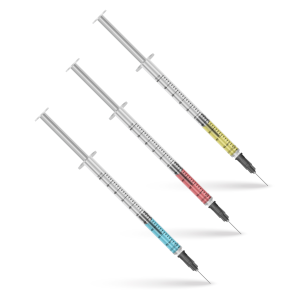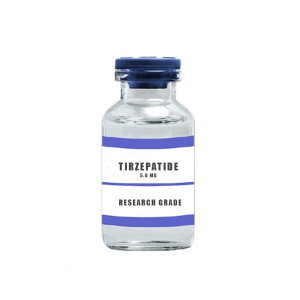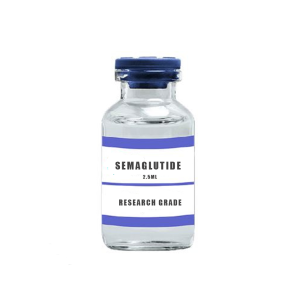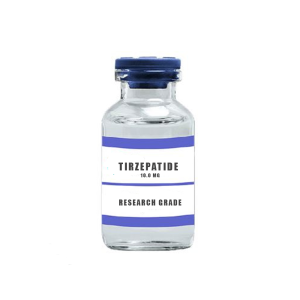Semaglutide 5mg Vial
Original price was: $250.00.$219.95Current price is: $219.95.
Semaglutide is derived from the naturally occurring peptide GLP-1, which is known to lower blood sugar levels and boost insulin production. It is widely used to treat type 2 diabetes and is growing in popularity as an effective treatment for obesity.
Available dosages: 2,5mg and 5mg vials *(Research Grade)
Information about Semiglutide
Semiglutide is not a fly-by-night weight-loss supplement that makes unfounded promises. It is a carefully researched medication with approval from the US Food and Drug Administration (FDA), that was discovered to be a "missing link" for weight loss by accident.
Semaglutide first gained FDA approval as a treatment for type 2 diabetes. When used as part of a lifestyle update, Semaglutide injections have been shown to help control blood sugar levels in people living with type 2 diabetes. Additionally, Semaglutide is used to help reduce the risk of stroke, heart attack, and heart disease in people with type 2 diabetes. However, this medication has received much attention for other reasons recently.
Semaglutide injections are quickly becoming famous for weight loss. When used as part of an individualized plan that includes calorie adjustments and exercise, Semaglutide can help overweight adults lose significant weight. The treatment is especially promising for people seeking to shed pounds quickly due to obesity-related health risks tied to high blood pressure, high cholesterol, and diabetes. The best part is that nobody has to feel hungry when losing weight with Semaglutide.
Injections mimic the body's own natural hunger-suppressing hormones, that are triggered when the stomach is full. Is Semaglutide the ultimate hack for losing weight without feeling deprived? Take a look at what everyone struggling with weight loss need to know about what is shaping up to be the most promising injectable medication for weight loss ever.
How does Semaglutide work
Semaglutide is a medication that works by mimicking the action of the hormone GLP-1 (Glucagon Like Peptide - 1) in the body. GLP-1 is naturally produced in the stomach and stimulates the release of insulin from the pancreas, which helps to regulate blood sugar levels. GLP-1 also slows down the rate at which feed moves through the stomach, which can help reduce appetite and promote feelings of fullness.
Semaglutide is a GLP-1 receptor agonist, which means that it binds to the same receptors in the body as GLP-1 and has a similar effect. When Semaglutide is injected, it binds to GLP-1 receptors in the brain, which can help reduce appetite and food cravings. It also slows down the emptying of the stomach, which helps to promote feelings of fullness and reduce the amount of food consumed.
The exact mechanism by which Semaglutide promotes weight loss is not fully understood, but it is thought to be related to several factors. In addition to reducing appetite and promoting feelings of fullness, Semaglutide may also help to increase energy expenditure and promote the burning of fat for energy.
Clinical studies have demonstrated that Semaglutide can lead to significant weight loss in patients with obesity or who are overweight, and who have at least one weight-related comorbidity, such as high blood pressure, type 2 diabetes, or high cholesterol. In a large clinical trial known as STEP 1, patients who received SemaGlutide lost an average of 15% of their body weight over a period of 68 weeks, compared to an average of 2.4% in the Placebo group.
Semaglutide is administered once a week as a subcutaneous injection and is typically used in conjunction with a reduced-calorie diet and increased physical activity. It is important to note that Semaglutide is not a magic solution for weight loss and should be used as part of a comprehensive weight-loss program that includes lifestyle changes and behavior modifications. Additionally, Semaglutide may not be suitable for everyone, and should only be used under the guidance of a healthcare professional.
Impact on Hunger Cues
Whenever we eat food, the foods we are eating actually activate the appetite centers in the brain. Under normal conditions, we would feel full when we are done eating. This happens due to the release of a gut hormone called GLP-1 that essentially shuts down the brain's hunger cues. Some people don't experience these cues because their bodies are not producing the levels of GLP-1 needed to make them feel full.
When Semaglutide is injected, it mimics the GLP-1 hormone to affect the receptors that shut down the feelings of hunger. That means that the patient experiences complete fullness and satisfaction when consuming much less food than normal. Studies have found that taking Semaglutide is associated with fewer food cravings, less hunger, and better control of food intake. Taking Semaglutide also results in a lower preference for high-fat foods.
For many people, using Semaglutide weekly marks the end of cravings, frenzied eating, and constant feelings of hunger.
Regulated Bood Sugar
Semaglutide belongs to a class of medications called incretin mimetics. These medications help to regulate digestion and metabolic activity by helping the pancreas to release the correct amounts of insulin when blood sugar levels spike.
Together with exercise and a healthy diet, Semaglutide is very effective at helping to regulate the body's blood sugar levels.
Feeling of Fullness
Semaglutide injections slow down the movement of food thru the stomach. This gives a patient's body more time to feel fuller on fewer calories. In addition, Semaglutide injections help the pancreas release the proper amount of insulin to correspond with blood sugar levels to create a stable, comfortable, full feeling. The result is a strong reduction in appetite that allows patients to feel full and energized when consuming much less food.
The History of Semaglutide
Semaglutide is a Glucagon-Like-Peptied - 1 (GLP-1) receptor agonist used for the treatment of type 2 diabetes. It is a synthetic analogue of human GLP-1 that was developed by the Daish Pharmaceutical Company "Novo Nordisk".
The development of Semaglutide began in the 1990s with the discovery of the GlP-1 receptor and the role of the CLP1 in glucose homeostasis. Novo Nordisk researchers began work on developing Semaglutide in the early 2000s as a treatment for type 2 diabetes.
In 2012, the first phase 3 clinical trial for Semaglutide was initiated. The trial, known as SUSTAIN 1, evaluated the safety and efficacy of Semaglutide in comparison to other GLP-1 receptor agonists. The trial demonstrated that Semaglutide was more effective in reducing blood glucose levels than other GLP-1 receptor agonists.
Subsequently, several other phase 3 clinical trials were conducted to further evaluate the safety and efficacy of Semaglutide. These trials demonstrated that Semaglutide was effective in reducing HbA1c levels and body weight, as also had a favorable safety profile.
in 2017, the US Food and Drug Administration (FDA) approved Semaglutide for the treatment of type 2 diabetes. Since then, Semaglutide has been approved for use in several other countries, including the European Union and Japan.
In addition to its use in diabetes, Semaglutide has also shown promise as a treatment for Obesity. In 2021, the FDA approved Semaglutide for chronic weight management in adults with obesity or who are overweight and who have at least one weight-related comorbidity.
Overall, the development of Semaglutide represents an important milestone in the treatment of type 2 diabetes and obesity. Its approval for use to treat these conditions has provided clinicians and patients with a new treatment option that can improve glycemic control, promote weight loss, and reduce the risk of complications associated with these conditions.
You may also like…
-
Sale!

Bacteriostatic Water
Original price was: $14.95.$12.95Current price is: $12.95. -

Professional Lab Long Sleeve Coat – black
$48.95 -
Sale!

Syringes 30g – 1cc
Original price was: $24.95.$19.95Current price is: $19.95. -

Professional Lab Long Sleeve Coat – pink
$48.95 -

Professional Lab Long Sleeve Coat – white
$48.95





Reviews
There are no reviews yet.